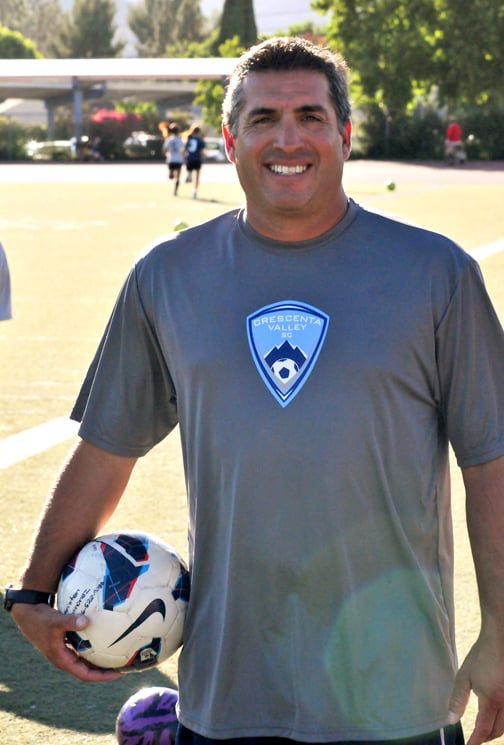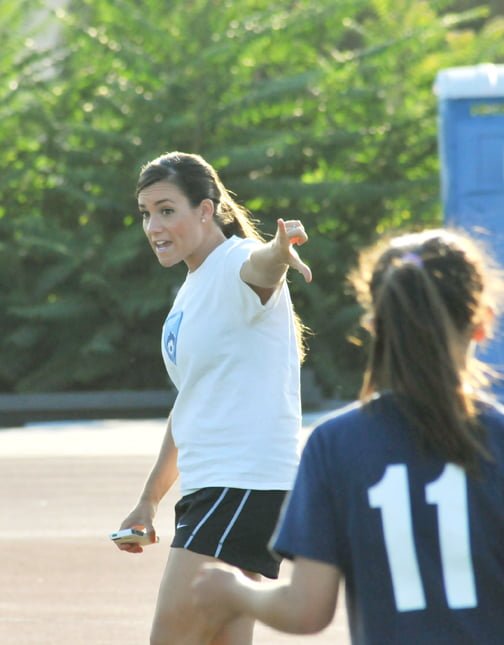
Reggie Rivas started the CV Soccer Club back in 2001 with the goal of giving local players the chance to hone their skills under the area’s top coaches.
Reggie Rivas’ soccer club has steadily gained popularity since 2001 and is now a Crescenta Valley mainstay.
By Brandon HENSLEY
It was technically evening, although the setting sun was still strong, and it forced Reggie Rivas to the shady part of the field, beyond the track near the drinking fountains. From there, the entire field at Crescenta Valley High School was visible, every corner of it covered with youth soccer teams doing warm-up drills, conditioning or getting other instructions from its coaches.
A mother and her young girl came up to Rivas and asked where Coach Brady Riggs and his team were. Rivas leaned in to the mother and pointed out Brady at the far end of the field: white shirt, bald head, “very nice, long goatee with the very cool looking roster, right over there.”
He made sure to address the girl before she walked away.
“Gracie, how ya doing?” he said. “I’m glad you’re here.”

The same could be said to Rivas from families involved in his program. Rivas is the founder of the Crescenta Valley Soccer Club, a year-round program that gives local youth players a chance to hone their skills under the area’s top coaches, including Rivas. It’s his pride and joy.
“It’s my life, with my wife and kids,” he said. “I’m a Falcon and I’m honored to be here every day.”
But it wasn’t always this way in La Crescenta. As Rivas and another coach now know, sometimes it takes a push to achieve something great.
_____________________
Rivas hails from Modesto, Calif. He graduated high school in 1993 and played soccer at Modesto Junior College. Eventually he found his way to Cal State Northridge, but he hurt his back during his tenure as a Matador, and called it a career.
While working the graveyard shift one night at a Costco in the valley, his coworker passed him a soccer ball, and Rivas began juggling it (bouncing it on his knees and feet without it hitting the ground). The coworker was so impressed he asked Rivas to train his young daughter.
Rivas resisted at first. In fact, it took him about a year before he finally gave in and trained the girl. He enjoyed the experience, but still wasn’t ready to give in to coaching. In 1999, he received a call from Matt Bogust who, along with his brother Judd, started girls’ soccer at Crescenta Valley High in 1990 and were coaches for the program.
Matt asked Rivas if he was interested in being the junior varsity coach, and Rivas said he wasn’t sure. Like so many, he didn’t even know where CV was.
“I said, ‘How do you get there?’ He said take the 118 [freeway] to the 210,” Rivas said. “I said, ‘What’s the 210?”
Rivas signed on, and took over the girls’ varsity team after then-coach Bud Dain resigned in early 2000. It was during that time Rivas discovered something. He asked how many players on varsity and JV played club soccer, and the response he mostly received was, “What’s club soccer?”
Some players did say they played club, but it sure wasn’t near CV. Jorden Schulz – then Jorden Stanley – for example, played out in Claremont. Other clubs were available in Santa Clarita or Santa Anita.
Rivas thought with all of the great athletes in the area, it’s not right they all have to drive a ways to play competitively.
“The light bulb clicked and I said we need something here,” Rivas said.
In 2001, Rivas created Crescenta Valley Soccer Club. It was small; one girls team, 14 players. Twelve years later, the club consists of 22 teams, about 350 players. The teams travel a lot – Las Vegas, Utah, Texas – and win a lot (check cvsoccerclub.com for a comprehensive list).
The club feeds a growing desire from the community to learn more about the sport, and to improve. As kids progress through the club, they eventually enter high school, and one of Rivas’ goals for starting CVSC was to make the Pacific League, which includes schools like CV, Glendale and Hoover, better all around.
“I wanted it to be where CV was a dominate force, and then also have other high schools be better, like Glendale and Hoover, and St. Francis,” said Rivas, who coaches three club teams. “Make all of them better in their respective leagues.”
Neal Bird, the club president, said if not for Rivas’ foresight, things would be different.
“He’s helping the community,” Bird said. “Soccer’s been better at Crescenta Valley, La Cañada and the surrounding areas.”
Bird has three daughters, Nicole, Olivia and Rachel, who all played varsity last season at CV, the first time that’s ever happened. They were coached by none other than Schulz, who also coaches a U13 team for the club.
Rivas and Schulz have been teaming up for a while now, with Schulz being a key player on his 2002 Lady Falcons team that made it to the CIF Division II championship game.
But like Rivas, Schulz didn’t have coaching on the brain initially. While still in college, Rivas asked her to fill in for a practice one day for a club team.
“I was like, ‘Okay? I have not been around for a whole year. What do you want me to do?’” Schulz recalled. “And I’m not kidding, ever since that one practice, I’ve never stopped.”
Rivas eventually put her on as a high school coach, too.
“He basically … forcefully helped me get into it, and it just kind of stuck,” she said.
Good thing for Rivas.
“She can bring a lot to these kids,” Rivas said. “She is a great role model. I love Jorden and I want these kids to get experience from her.”
Nicole, the oldest Bird sister who will attend Cal Lutheran University this fall, said Schulz has a personal approach in dealing with players that is comfortable.
Schulz’s age – 27 – definitely helps.
“You can relate to her so easily,” said Rachel, a varsity sophomore.
Not only does the club have Schulz – whose varsity girls’ team annually competes for a league title – but it also has Grant Clark. Clark led the CV High boys to a CIF Division IV championship in 2012, the first ever for the program.
“He does a lot of fun drills in practice,” said 12-year-old Ricky Parada, a player for Clark. “He does everything with a purpose.”
“It’s cool because it’s helping me get ready for the varsity team,” said 13-year-old Zander Bakunowski.
Players say the atmosphere is one reason they enjoy the club.
“They create good soccer players,” said 16-year-old Lauren Busta. “They create teams that connect well. It’s like a second family, I would say.”
“My team is my family,” said Rachel. “I’m super close with them, and they know everything about me. It wasn’t like that on another club I was on.”
Coach Felipe Rodriguez leads coaching education meetings, and that means the program is not just about having fun. Kids sign up to get noticed, and since that’s the case, Schulz needs her players to push themselves.
“Do you want to play in college?” she said. “If you do, we’re going to make you try to develop the skills necessary to get there, and you’re going to have to win some tournaments.”
You don’t have to ask Nicole to get passionate about the club. Her last game of her career came in May, in a quarterfinal tournament game in Apple Valley. Her team lost in penalty kicks. Later that night she was at a dinner for her friend and, with the game fresh in her mind, broke down.
“I cried for the whole weekend,” she said.
Nicole will now try to succeed in college, while Schulz will stay, doing what she never thought she would love. She’s a mother of a young son, and said she always just wanted to be a mom, “so the fact that I can be a mom and enjoy my kid for a whole day and then [coach] an hour and a half – I’m living the dream.”
So is Rivas. He wouldn’t have thought his club would be this popular 12 years ago, but it’s a testament to how certain roads can lead to big things. He had to start somewhere, and he’s not done. He wants bigger success for his players, and for this area.
“Who says the next Mia Hamm can’t come from this area?” he said. “They can. We just have to nurture that, and I want the next national player to come from here.”



































































